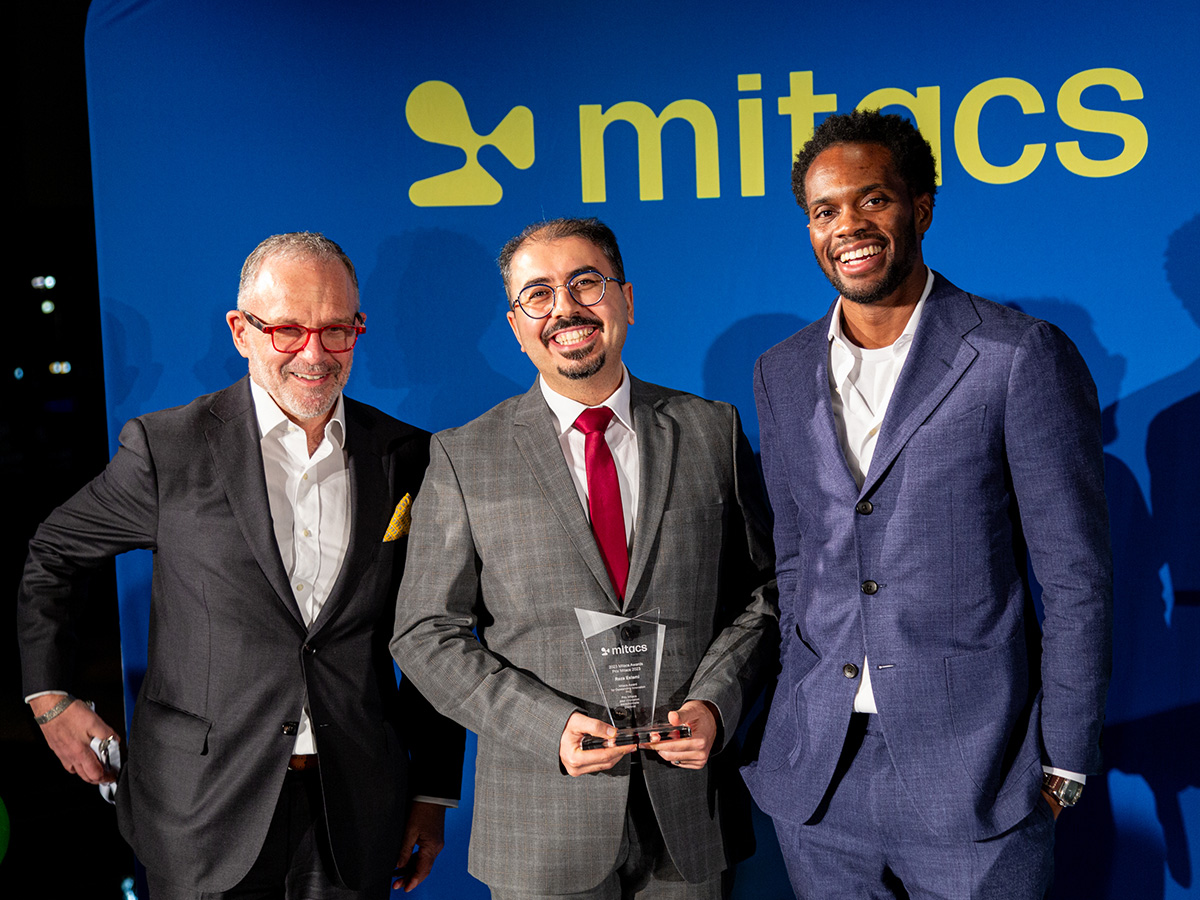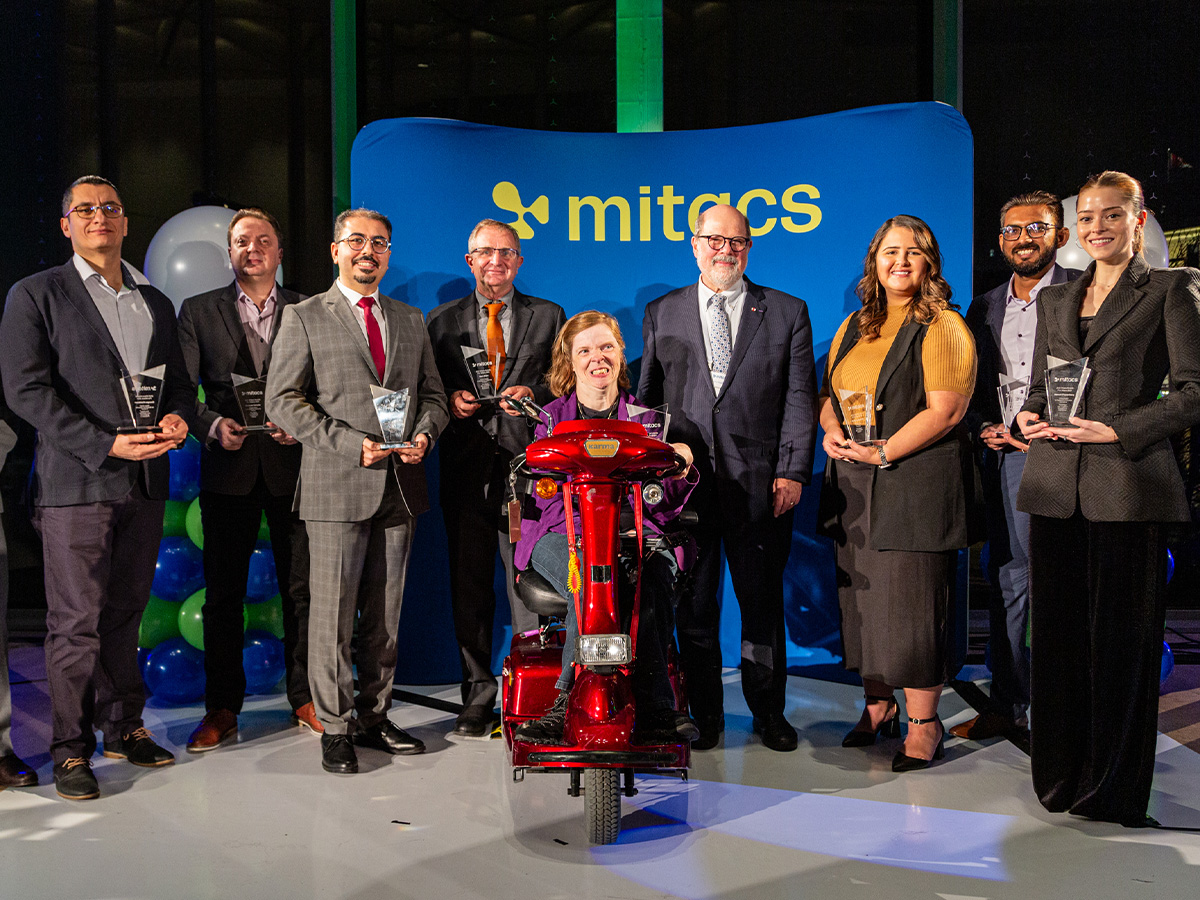Toronto Researcher Wins Prestigious Mitacs Award for First-of-its-Kind Smart Clothing that Monitors Glucose Levels Through Sweat

Reza Eslami receiving the Mitacs Award for Outstanding Innovation—PhD at the 13th Mitacs Awards.
Toronto, ON — While visiting a long-term care residence in 2016, chemical engineer Reza Eslami couldn’t help but notice a senior struggling to perform their finger prick diabetes test. He immediately thought there had to be a better way and pivoted his electrochemical research to investigate.
Now, seven years later, his startup — called Sensofine — is on the verge of revolutionizing diabetes management for the nearly 30% of Canadians living with the disease, by making blood-glucose monitoring as easy as putting on a shirt.
The groundbreaking work has earned Eslami the Mitacs Award for Outstanding Innovation—PhD, awarded by Mitacs (external link) , a national innovation organization that connects industry to the top talent they need to achieve their business goals and drive economic success. Delivery of Mitacs programs and partnerships is supported by the government of Ontario. The award will be presented at a ceremony at the National Arts Centre in Ottawa on November 22.
Eslami — who started his company as a PhD student at Toronto Metropolitan University (TMU) under the supervision of chemical engineering professors Dr. Hadis Zarrin and Dr. Mehrab Mehrvar — is being recognized for developing a first-of-its-kind smart garment that continuously measures blood sugar levels from sweat, using sensors and a body-adapted self-powered system that produces their own electric charge from everyday movements like walking. The innovation accurately measures blood-glucose levels from just microlitres of sweat (one-millionth of a litre), and if more sweat is required, it will automatically stimulate the skin to produce it. Readings are sent to any paired device, such as a smartphone, smartwatch or tablet.
As Eslami explained, the approach builds on earlier research into using sweat to measure glucose levels and is intended to be a precise, continuous and pain-free alternative to blood monitoring devices, like those that mount on an arm. “Because glucose is 100 times less concentrated in sweat than in blood, we expect our device to be more sensitive than existing blood-glucose monitors,” he said. “We’re also removing the need to worry about battery life because only one to two hours of small, typical movements will provide enough energy to power the device for 24 hours.”
With his proof-of-concept complete — a wrist brace that is worn on the hand — Eslami is expecting to start user testing within the next year and is currently collaborating with Toronto-based OCAD University and WIMTACH (Wearable, Interactive and Mobile Technology Access Centre in Health) at Centennial College to develop the first batch of the beta version of the wearable device, which will be an undergarment. The company is also investigating more functional clothing as well as a wristband, with the goal of going to market in 2025.
A Governor General’s Gold Medal recipient who achieved a perfect grade point average, Eslami credits Mitacs for providing the funding and motivation required to see his idea through to fruition. “Mitacs has supported me through six collaborations, including the hiring of four full-time research interns, and has been instrumental in spring boarding my company’s launch, growth and path to commercialization,” he said, emphasizing the value of transferring scientific knowledge out of academic circles into industry, where it can positively impact people’s lives.
Moving forward, Eslami aims to further develop the platform to monitor as many as 13 health parameters, including joint movement, temperature and cortisol levels for stress management. “We see this as a general health monitoring device, where you can rely on your sweat or skin, your clothing and an app on your phone to keep you healthy,” he said.
The Mitacs Award for Outstanding Innovation—PhD is presented to a Mitacs intern who has made a significant achievement in research and development innovation during their Mitacs-funded research. Mitacs is supported by funding from the Government of Canada and provincial and territorial governments across the country.
Eslami is one of nine Mitacs award winners nationally, chosen from thousands of researchers who take part in Mitacs programs each year. The remaining eight recipients were recognized for outstanding innovation, commercialization or exceptional leadership in other areas of research.

Reza Eslami standing with the other Mitacs award recipients at the 13th Mitacs Awards ceremony
In congratulating the winners, Mitacs CEO John Hepburn reflected on Mitacs’ 25-year history of providing Canadian innovators with opportunities for experiential skills development through strategic partnerships between industry, government and academia. “Mitacs is honoured to play a pivitol role in empowering industry leaders across Canada to foster game-changing ideas, and we couldn’t be more pleased to celebrate their significant achievements with these awards,” Hepburn said.
For more information about the Mitacs awards and a full list of winners, visit www.mitacs.ca/newsroom (external link) .
About Mitacs
Mitacs is a not-for-profit organization that fosters growth and innovation in Canada by solving business challenges with research solutions from academic institutions. It is funded by the Government of Canada, along with the Government of Alberta, the Government of British Columbia, Research Manitoba, the Government of New Brunswick, the Government of Newfoundland and Labrador, the Government of Nova Scotia, the Government of Ontario, Innovation PEI, the Government of Quebec, the Government of Saskatchewan and the Government of Yukon. For information about Mitacs and its programs, visit mitacs.ca/newsroom.